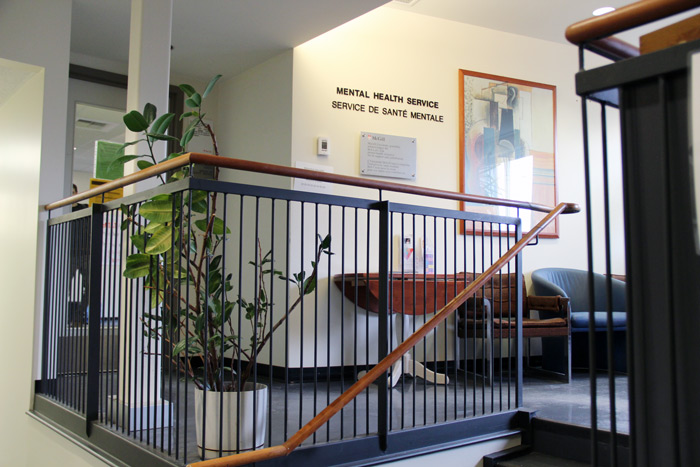On March 31, the McGill Students’ Mental Health Working Group released an open letter addressed to Deputy Provost (Student Life and Learning) Ollivier Dyens, expressing concerns about the recent restructuring of McGill Counselling and Mental Health Services (MCMHS). Counselling and Mental Health Services were separate units until they were combined into one service in Fall 2016. This integration introduced the Stepped Care Model, which by design is intended to deliver the most effective and least intensive treatment to patients appropriate to their needs, according to the Student Services website.
According to Dyens, the integration of stepped care has shortened wait times.
“We have eliminated a waitlist of more than 100 students from the Mental Health unit,” Dyens wrote in an email to The McGill Tribune. “By implementing Stepped Care, treatments start sooner because students first meet with the clinician who will follow their care.”
Though the wait list has been cut down, the changes have created new concerns. According to Erin Sobat, Students’ Society of McGill University (SSMU) Vice-President (VP) University Affairs, one of the issues has been the implementation of the Client Care Clinician (CCC) role as part of Stepped Care. Existing psychologists and psychotherapists have been assigned as CCCs, who act as case managers for students.
“Students are randomly assigned a CCC who may be either a counselling psychologist or a clinical psychologist (psychotherapist) […] this person is expected to provide them with therapy whether or not they are actually an appropriate match,” Sobat wrote in an email to the Tribune. “Our biggest concern is that this further limits access for students with mental illness to receive specialized psychological care, and may in fact put students in crisis or borderline situations in further danger [if they see a CCC who is not adequately trained to deal with the issue].”
According to Sobat, multiple students have reported difficulties in changing their CCC.
Chloe Rourke, mental health advocate and former Mental Health Education Coordinator at McGill Mental Health Services, wrote in an email to the Tribune that some staff have found the adjustments to their role challenging.
“[Staff] are now being asked to fulfill the role of case managers for each individual student in addition to being their therapists, but this is a fundamentally different role,” Rourke wrote. “A case manager is not necessarily the same person who should be providing direct treatment.”
The open letter also states that clinicians were silenced or dismissed when they raised concerns about the changes to MCMHS. According to a MCMHS staff member, who wished to remain anonymous, it became clear in the months building up to the suspension and subsequent departure of former clinical director Dr. Nancy Low in December 2016 that staff concerns were not being heard and that the changes would be integrated.
“Many of the issues regarding the harmonization of Counselling and Mental Health Services and the implementation of the stepped care model were apparent to staff members before the changes were implemented,” the staff member said. “[…] there is a feeling that these issues could have been avoided if clinicians and counsellors were properly consulted to begin with.
According to Associate Clinical Director Giuseppe Alfonsi, who has been the acting head of MHS, MCMHS is trying to find an interim replacement.
“Dr. Low is a dearly respected colleague of ours and certainly has been missed,” Alfonsi wrote in an email to the Tribune. “However, we are mostly looking towards the future and hoping to find a suitable interim replacement.”
The MCMHS staff member noted a shift in morale in the unit after Dr. Low’s suspension.
“For McGill to get rid of one of its own without adequate consideration of the effect on staff, and more importantly students, sends a clear message about the administration's priorities,” the staff member said.
Morgan Grobin, U3 Engineering, believes the integration is a step in the right direction, though she has encountered barriers in accessing the help she needs. Grobin waited from November 2016 to January 2017 to see a counsellor and was first referred to a psychiatric nurse before finally getting an appointment with a psychiatrist who was able to prescribe her medication.
“I wish the counsellor could have referred me directly to the psychiatrist,” Grobin said. “Once I accessed care, the outcome was always positive.”
Another student, who asked to remain anonymous, was hospitalized in second year and saw a psychiatrist, but was not set up for follow up appointments. Since then, the student has seen 10 other counsellors, psychiatrists, and therapists, several of whom left or went on leave shortly after beginning the student’s sessions. The student’s current therapist is reducing her hours.
“The feeling I’m getting is that there were a lot of promises made regarding the integration,” the student said. “I think [the doctors] are getting frustrated with the way things are getting set up. There are bound to be difficulties in putting together two offices that were working separately.”
Dyens noted that end-of year surveys have been scheduled for the Office for Students with Disabilities (OSD), the Student Health Service, and MCMHS. Dyens expressed that MCMHS is open to hearing student feedback.
“We [will] continue to listen to students about their concerns and will continue to adjust our services and practices as need be in order to better serve their needs,” Dyens wrote. “We want all our students to be treated with respect and care […] We will respond [to the open letter] by making sure our services are the best they can be.”








